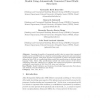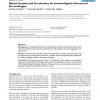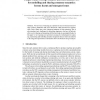450 search results - page 12 / 90 » An enriched knowledge model for formal ontological analysis |
116
click to vote
JUCS
2010
14 years 6 months ago
2010
: Assessing the quality of conceptual models is key to ensure that conceptual models can be used effectively as a basis for understanding, agreement and construction of information...
123
click to vote
WWW
2004
ACM
16 years 13 days ago
2004
ACM
For the manual semantic markup of documents to become widespread, users must be able to express annotations that conform to ontologies (or schemas) that have shared meaning. Howev...
BMCBI
2007
14 years 12 months ago
2007
Background: An adequate and expressive ontological representation of biological organisms and their parts requires formal reasoning mechanisms for their relations of physical aggr...
107
click to vote
ICCS
2005
Springer
15 years 5 months ago
2005
Springer
Abstract. We have been witnessing an explosion of user involvement in knowledge creation, publication and access both from within and between organisations. This is partly due to t...
133
Voted
ICCS
2005
Springer
15 years 5 months ago
2005
Springer
Abstract. Morphisms constitute a general tool for modelling complex relationships between mathematical objects in a disciplined fashion. In Formal Concept Analysis (FCA), morphisms...



